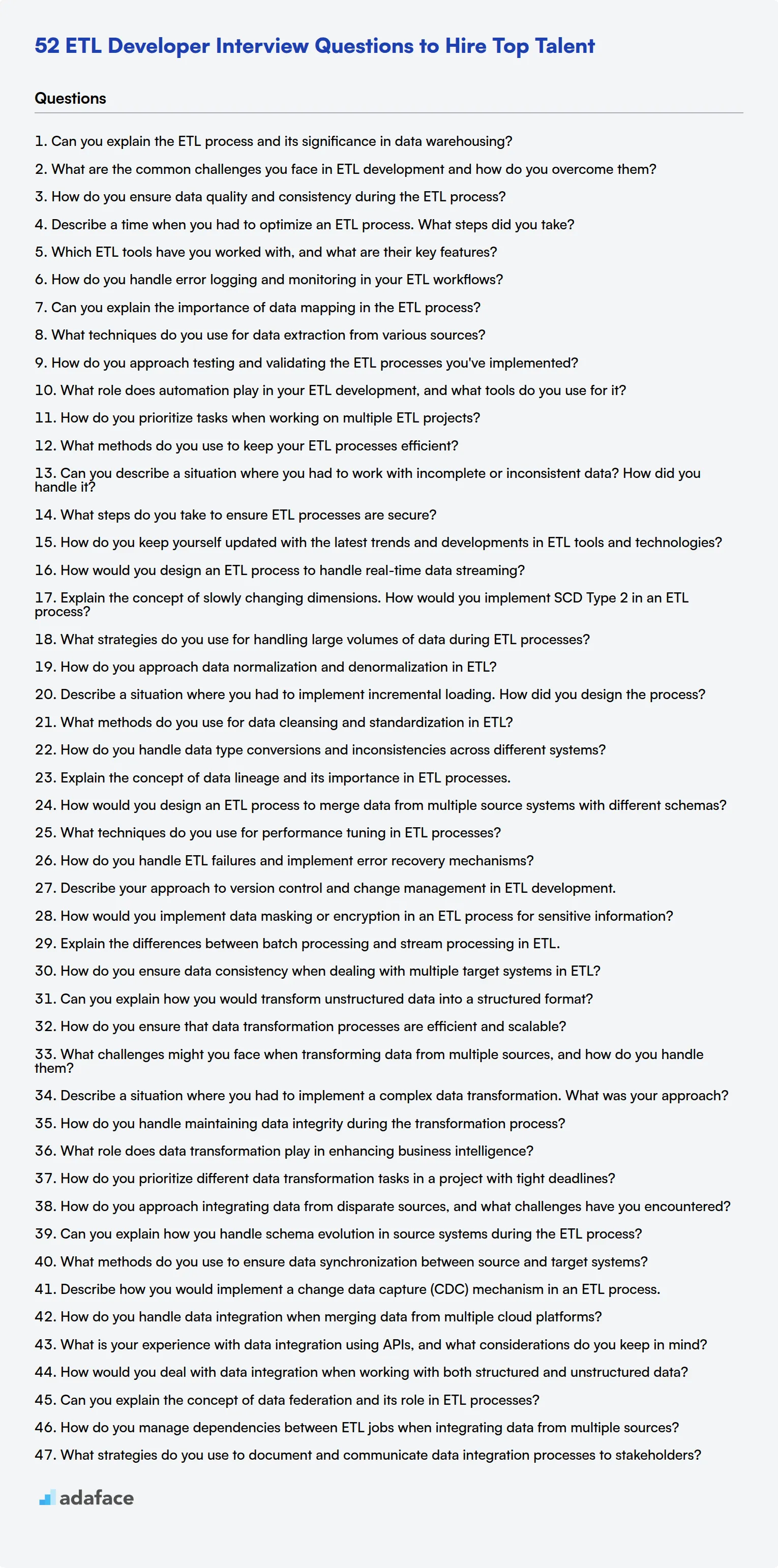Hiring the right ETL Developer is crucial for organizations looking to efficiently manage and transform their data. Asking the right interview questions can help you identify candidates with the necessary skills and experience to excel in this role.
This blog post provides a comprehensive list of ETL Developer interview questions, ranging from basic to advanced. We've categorized the questions to help you assess candidates at different experience levels and evaluate their knowledge of data transformation and integration.
By using these questions, you can make more informed hiring decisions and find ETL Developers who align with your organization's needs. Consider combining these interview questions with a pre-employment assessment to thoroughly evaluate candidates' technical skills before the interview stage.
Table of contents
10 common ETL Developer interview questions to ask your candidates
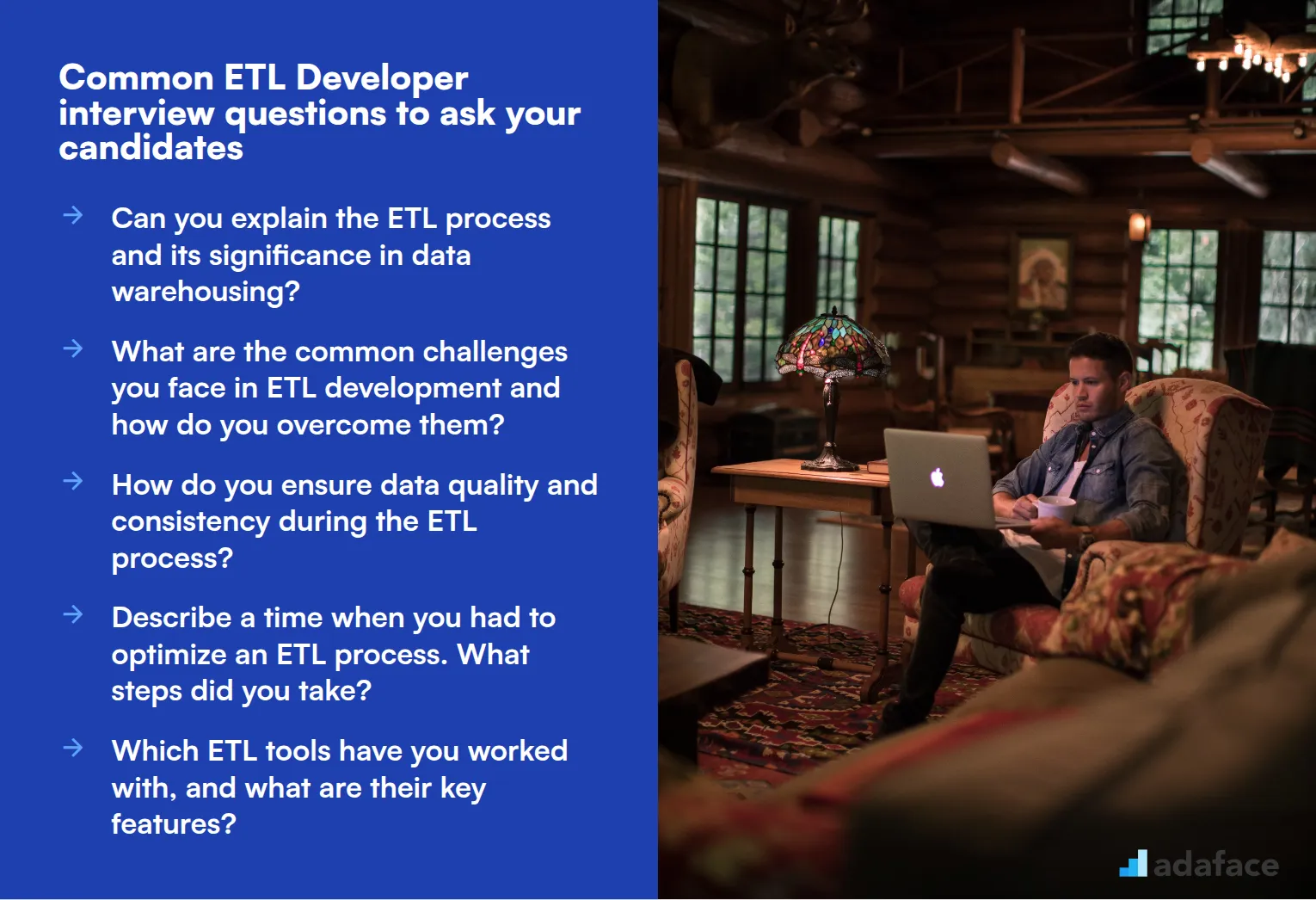
To ensure you find the right fit for your ETL Developer position, use this list of targeted interview questions. These questions will help you assess candidates' technical skills and practical experience in data transformation processes. For more insights on job roles, check out the ETL Developer job description.
- Can you explain the ETL process and its significance in data warehousing?
- What are the common challenges you face in ETL development and how do you overcome them?
- How do you ensure data quality and consistency during the ETL process?
- Describe a time when you had to optimize an ETL process. What steps did you take?
- Which ETL tools have you worked with, and what are their key features?
- How do you handle error logging and monitoring in your ETL workflows?
- Can you explain the importance of data mapping in the ETL process?
- What techniques do you use for data extraction from various sources?
- How do you approach testing and validating the ETL processes you've implemented?
- What role does automation play in your ETL development, and what tools do you use for it?
8 ETL Developer interview questions and answers to evaluate junior ETL Developers
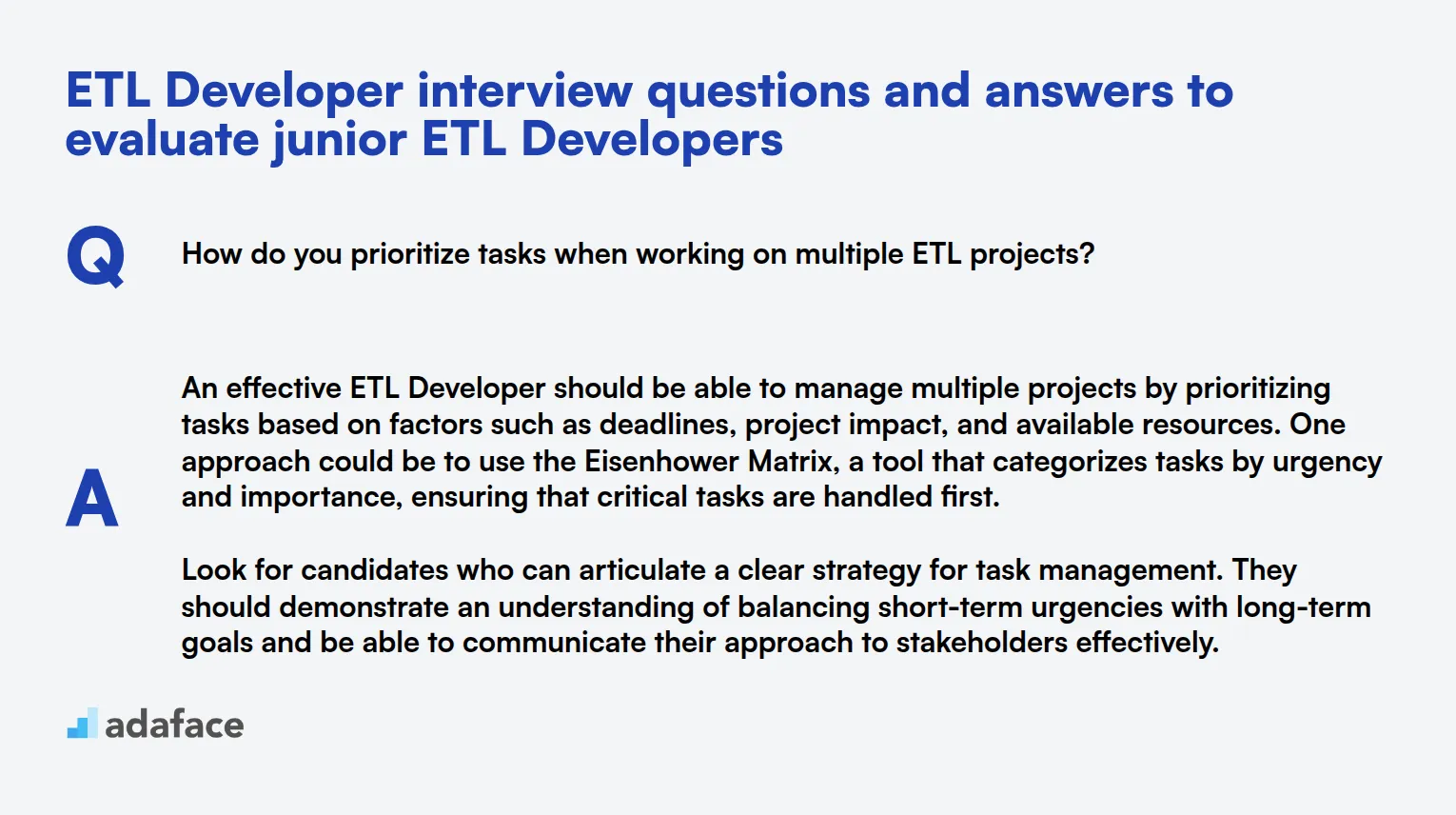
If you're on a quest to find the ideal junior ETL Developer, this list of questions is your treasure map. Designed to dig beneath the surface, these queries will help you assess candidates' problem-solving skills and their understanding of essential ETL concepts. Use these questions to uncover whether your applicants have the right foundation to grow and shine in your team.
1. How do you prioritize tasks when working on multiple ETL projects?
An effective ETL Developer should be able to manage multiple projects by prioritizing tasks based on factors such as deadlines, project impact, and available resources. One approach could be to use the Eisenhower Matrix, a tool that categorizes tasks by urgency and importance, ensuring that critical tasks are handled first.
Look for candidates who can articulate a clear strategy for task management. They should demonstrate an understanding of balancing short-term urgencies with long-term goals and be able to communicate their approach to stakeholders effectively.
2. What methods do you use to keep your ETL processes efficient?
Keeping ETL processes efficient involves several strategies, such as optimizing data transformations, minimizing data movement, and reducing resource consumption. For example, using incremental data loads instead of full loads can significantly improve efficiency.
An ideal candidate will mention specific techniques they've employed in the past and explain how these methods improved system performance. They should also show a proactive attitude toward learning and implementing new optimization techniques.
3. Can you describe a situation where you had to work with incomplete or inconsistent data? How did you handle it?
Handling incomplete or inconsistent data requires a methodical approach. A candidate might describe using data profiling tools to assess data quality and applying data cleansing techniques to address issues. This could involve filling missing values, correcting errors, or standardizing data formats.
The candidate should demonstrate problem-solving skills and the ability to implement solutions that enhance data reliability. Look for responses that highlight attention to detail and a methodical approach to improving data quality, which is critical for successful ETL processes.
4. What steps do you take to ensure ETL processes are secure?
Ensuring the security of ETL processes involves implementing measures like data encryption, access controls, and regular security audits. A candidate might discuss using encryption to protect data both in transit and at rest and applying role-based access controls to restrict data access to authorized users only.
An ideal response will illustrate a comprehensive understanding of security practices relevant to ETL development. The candidate should express a proactive mindset toward maintaining data security and be knowledgeable about compliance standards relevant to their field. You can learn more about the skills required for this here.
5. How do you keep yourself updated with the latest trends and developments in ETL tools and technologies?
Staying updated with the latest in ETL involves continuous learning through various channels such as online courses, webinars, industry conferences, and peer networking. A candidate might mention subscribing to relevant tech blogs or being part of professional groups on platforms like LinkedIn.
Look for candidates who exhibit a strong commitment to professional development. Their response should reflect a curiosity and willingness to adapt to new tools and methodologies, which is essential in the rapidly evolving field of data management.
15 intermediate ETL Developer interview questions and answers to ask mid-tier ETL Developers.
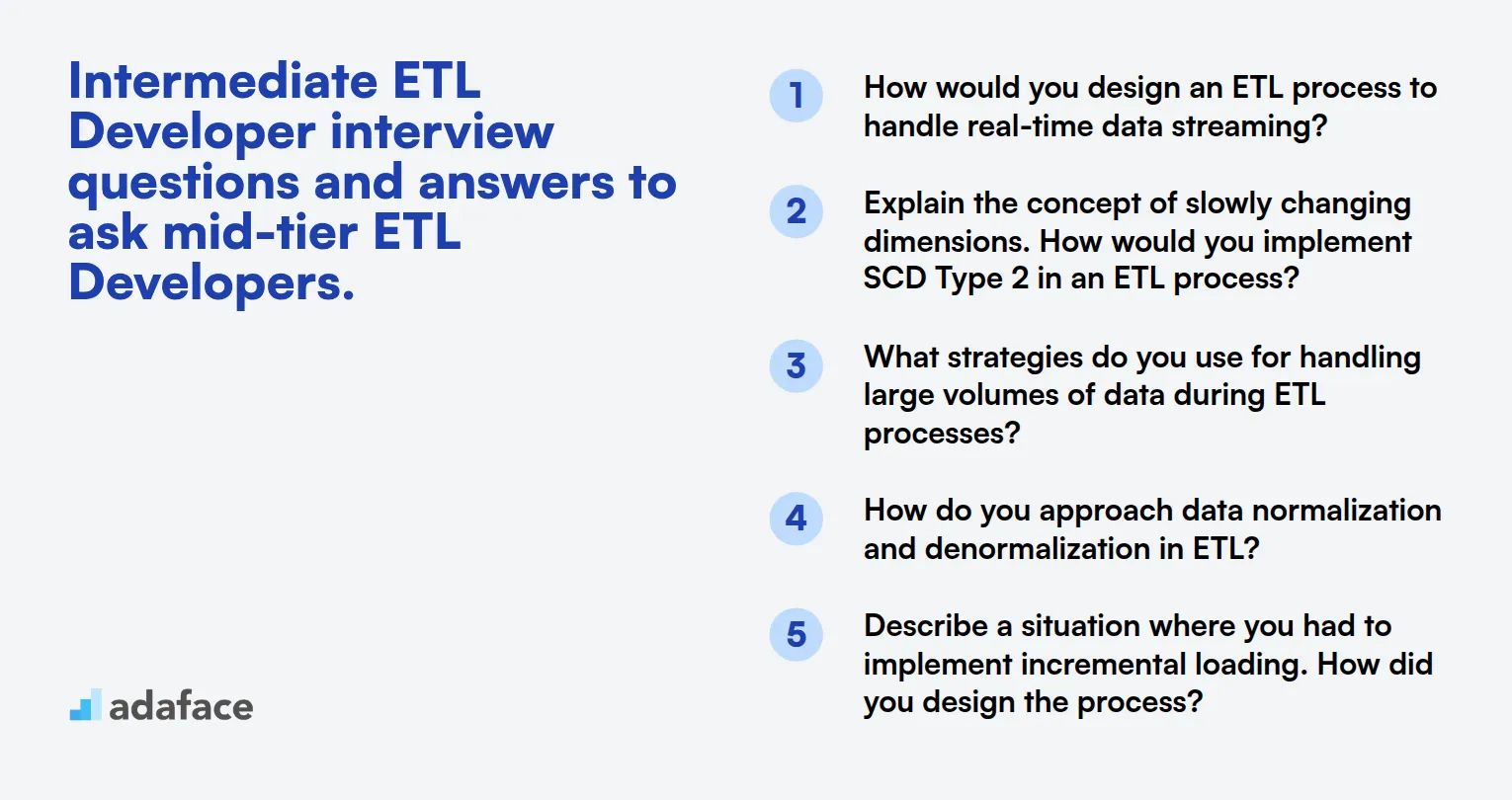
To assess the proficiency of mid-tier ETL developers, use these 15 intermediate interview questions. These questions will help you evaluate candidates' practical experience, problem-solving skills, and technical knowledge in ETL processes and tools.
- How would you design an ETL process to handle real-time data streaming?
- Explain the concept of slowly changing dimensions. How would you implement SCD Type 2 in an ETL process?
- What strategies do you use for handling large volumes of data during ETL processes?
- How do you approach data normalization and denormalization in ETL?
- Describe a situation where you had to implement incremental loading. How did you design the process?
- What methods do you use for data cleansing and standardization in ETL?
- How do you handle data type conversions and inconsistencies across different systems?
- Explain the concept of data lineage and its importance in ETL processes.
- How would you design an ETL process to merge data from multiple source systems with different schemas?
- What techniques do you use for performance tuning in ETL processes?
- How do you handle ETL failures and implement error recovery mechanisms?
- Describe your approach to version control and change management in ETL development.
- How would you implement data masking or encryption in an ETL process for sensitive information?
- Explain the differences between batch processing and stream processing in ETL.
- How do you ensure data consistency when dealing with multiple target systems in ETL?
7 ETL Developer interview questions and answers related to data transformation
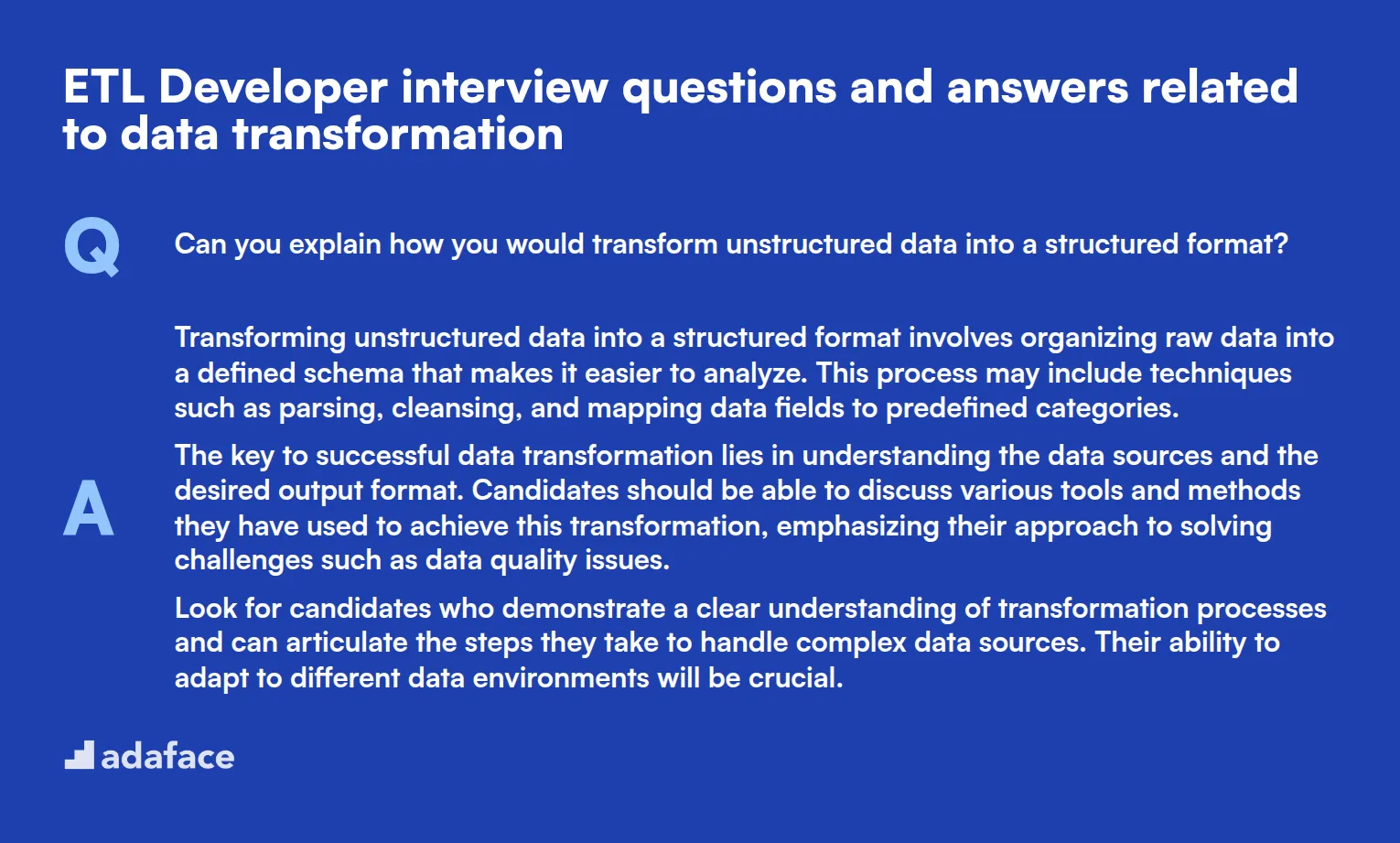
Unlock the mysteries of data transformation with these essential interview questions. Designed for recruiters and hiring managers, this list will help you distinguish between ETL developers who can truly transform raw data into valuable insights and those who might just be taking you for a ride.
1. Can you explain how you would transform unstructured data into a structured format?
Transforming unstructured data into a structured format involves organizing raw data into a defined schema that makes it easier to analyze. This process may include techniques such as parsing, cleansing, and mapping data fields to predefined categories.
The key to successful data transformation lies in understanding the data sources and the desired output format. Candidates should be able to discuss various tools and methods they have used to achieve this transformation, emphasizing their approach to solving challenges such as data quality issues.
Look for candidates who demonstrate a clear understanding of transformation processes and can articulate the steps they take to handle complex data sources. Their ability to adapt to different data environments will be crucial.
2. How do you ensure that data transformation processes are efficient and scalable?
Efficiency and scalability in data transformation are achieved by optimizing processes and utilizing tools that handle large volumes of data effectively. This may involve breaking down tasks into smaller, manageable units and using parallel processing or distributed systems.
Candidates should discuss their experience with performance tuning, such as reducing redundancy, minimizing data movement, and using efficient algorithms. They might also highlight the importance of monitoring and continuous improvement to keep processes up to date.
An ideal candidate will have a strategic approach to scaling transformations and a track record of implementing solutions that maintain performance even as data volumes grow. Ask about specific projects where they successfully scaled transformation processes.
3. What challenges might you face when transforming data from multiple sources, and how do you handle them?
One common challenge in transforming data from multiple sources is dealing with inconsistent formats and structures. Other issues include data duplication, varying data quality, and compatibility with target systems.
To address these challenges, candidates should use data integration techniques such as data cleansing, harmonization, and mapping. They might employ tools that standardize data formats and resolve conflicts in data quality before integration.
Look for candidates who can articulate a clear process for tackling these challenges. Their ability to identify potential issues early and apply appropriate solutions will be key to successful data transformation.
4. Describe a situation where you had to implement a complex data transformation. What was your approach?
Candidates should provide a specific example of a complex data transformation they've worked on, detailing the initial requirements, the challenges faced, and the solutions implemented. They might describe the use of specific tools or frameworks and the logic behind their transformation strategies.
A solid answer will include the steps taken to ensure data accuracy, the techniques used to handle large datasets, and any testing or validation processes employed to ensure the transformation met the business requirements.
An ideal response would demonstrate the candidate's ability to analyze complex situations, design effective solutions, and execute them with precision. Ask follow-up questions to explore their decision-making process and how they handle unexpected issues.
5. How do you handle maintaining data integrity during the transformation process?
Maintaining data integrity during transformation involves ensuring that data remains accurate, consistent, and reliable throughout the process. This includes implementing checks and balances, such as validation rules and error handling mechanisms.
Candidates should discuss their approach to data validation, highlighting methods for detecting and correcting anomalies. They might also mention the importance of maintaining an audit trail or data lineage for traceability and accountability.
Look for candidates who emphasize the importance of quality assurance in their processes and who have experience implementing robust integrity checks. Their ability to maintain high data standards will be crucial for reliable outcomes.
6. What role does data transformation play in enhancing business intelligence?
Data transformation is crucial for converting raw data into meaningful insights that can drive informed business decisions. By structuring and standardizing data, transformation processes enable more accurate analysis and reporting.
Candidates should articulate how transformed data supports business intelligence efforts by feeding into dashboards, visualizations, and predictive models. They might discuss their experience with specific business intelligence tools and how they integrate transformed data to provide actionable insights.
An ideal candidate will have a clear understanding of the connection between data transformation and business intelligence. They should be able to demonstrate how their work in data transformation has contributed to improved decision-making and business outcomes.
7. How do you prioritize different data transformation tasks in a project with tight deadlines?
Prioritizing data transformation tasks requires balancing urgency with importance, ensuring that critical tasks are completed first while maintaining overall project progress. Candidates might discuss their approach to project management, including setting clear goals and timelines.
They should emphasize their ability to assess task dependencies, allocate resources efficiently, and adjust plans as necessary to meet deadlines. Effective communication with stakeholders is also key to managing expectations and ensuring alignment.
Look for candidates who demonstrate strong organizational skills and a proactive approach to managing multiple tasks. Their ability to prioritize effectively will be essential in delivering successful data transformation projects on time.
12 ETL Developer interview questions about data integration
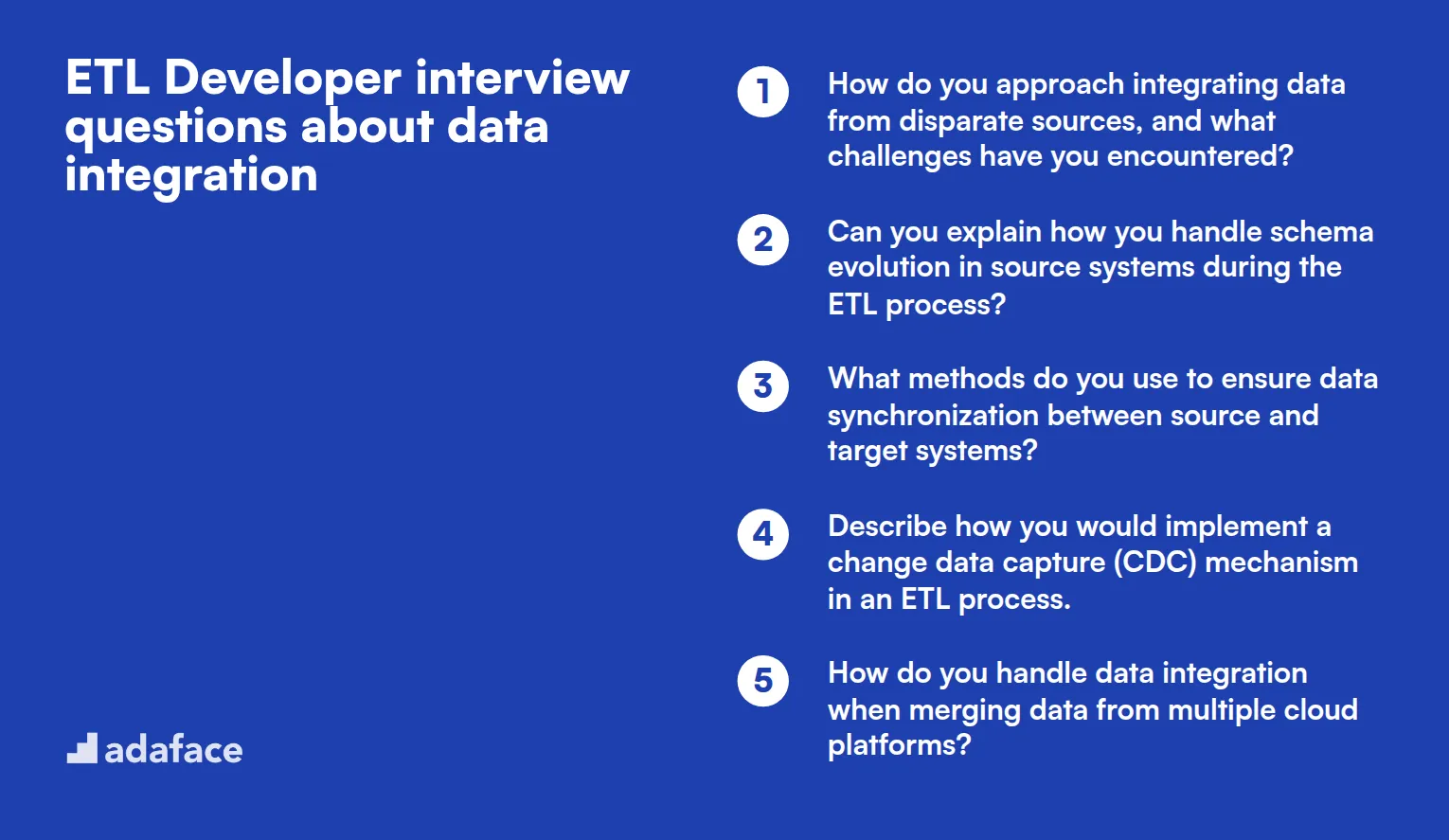
To assess candidates' understanding of data integration, you'll find these interview questions invaluable. They will help you gauge how well applicants can connect different data sources and ensure a seamless flow of information in your organization. For more insights, consider checking out the ETL Developer job description.
- How do you approach integrating data from disparate sources, and what challenges have you encountered?
- Can you explain how you handle schema evolution in source systems during the ETL process?
- What methods do you use to ensure data synchronization between source and target systems?
- Describe how you would implement a change data capture (CDC) mechanism in an ETL process.
- How do you handle data integration when merging data from multiple cloud platforms?
- What is your experience with data integration using APIs, and what considerations do you keep in mind?
- How would you deal with data integration when working with both structured and unstructured data?
- Can you explain the concept of data federation and its role in ETL processes?
- How do you manage dependencies between ETL jobs when integrating data from multiple sources?
- What strategies do you use to document and communicate data integration processes to stakeholders?
Which ETL Developer skills should you evaluate during the interview phase?
An interview can't reveal every detail about a candidate's capabilities, but focusing on specific skills can give you a significant insight into their potential as an ETL Developer. Identifying the right skills to evaluate ensures you find a candidate who not only fits the role technically but also aligns with the broader goals of the organization.
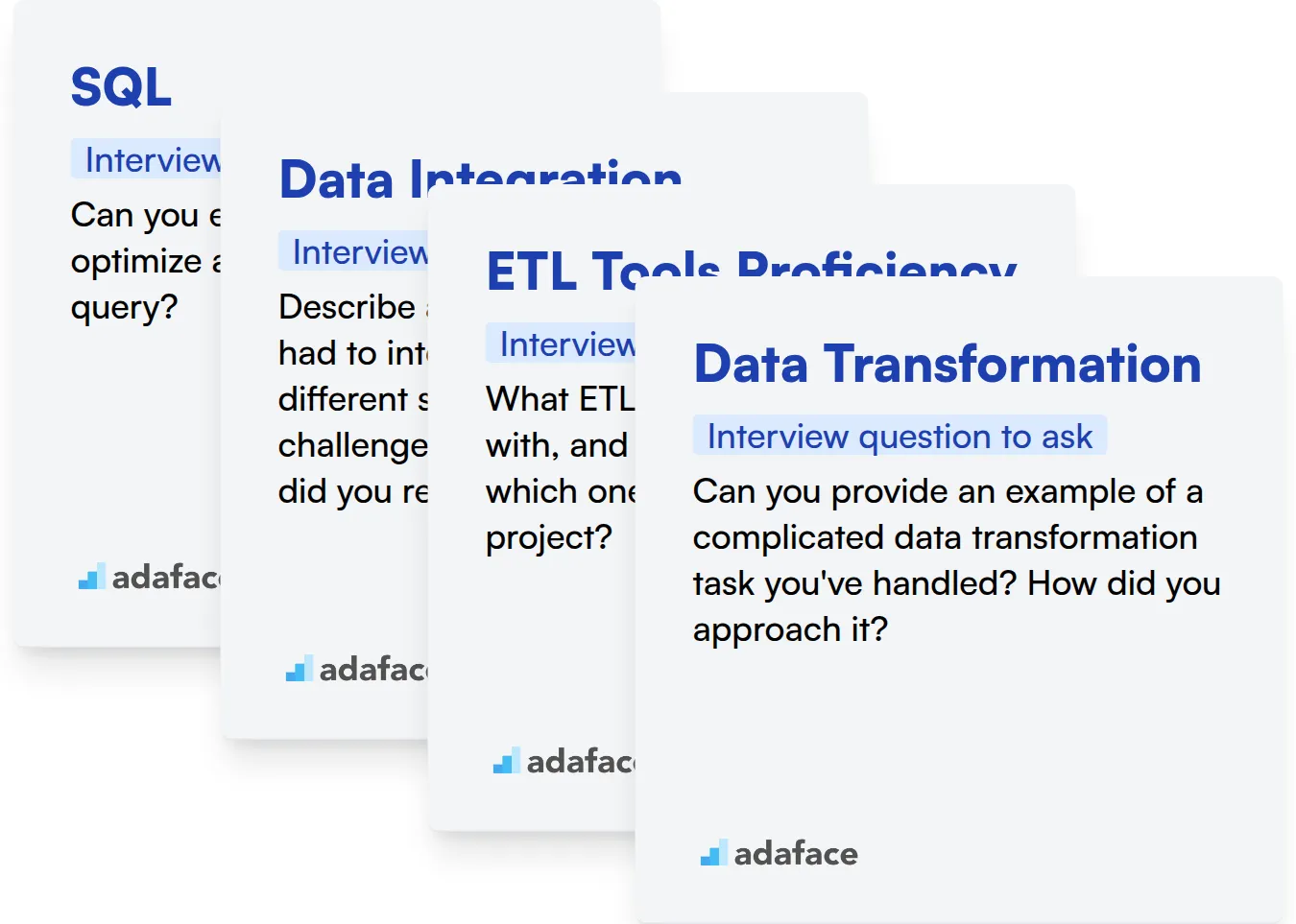
SQL
Using an SQL Coding Test can help you determine a candidate's ability to work with complex queries and data joins, filtering out those with strong SQL skills.
In addition to tests, targeted interview questions can help assess a candidate's practical SQL skills.
Can you explain how you would optimize a slow-running SQL query?
Look for candidates who understand query execution plans and can discuss methods like indexing, query restructuring, or using temporary tables.
Data Integration
Direct interview questions can effectively gauge a candidate's ability to handle complex data integration scenarios.
Describe a situation where you had to integrate data from different systems. What challenges did you face and how did you resolve them?
Candidates should demonstrate an understanding of data mapping, data cleansing, and the challenges of maintaining data consistency and quality.
ETL Tools Proficiency
An ETL Online Test can be useful to measure a candidate's proficiency with ETL tools.
Interview questions specifically about ETL tools can shed light on a candidate's hands-on experience and problem-solving abilities.
What ETL tools have you worked with, and how do you decide which one to use for a particular project?
Ideal candidates will discuss their experiences with various tools, their decision-making process, and how they adapt to new tools as needed.
Data Transformation
Targeted questions during interviews can help determine a candidate's competency in data transformation techniques.
Can you provide an example of a complicated data transformation task you've handled? How did you approach it?
Candidates should be able to explain the transformation logic, the challenges faced, and the solutions implemented to ensure data integrity.
3 Tips for Effectively Using ETL Developer Interview Questions
Before you start implementing what you've learned, here are our tips to optimize your interview process.
1. Incorporate Skill Tests Before Interviews
Skill tests can be a powerful tool in screening candidates prior to interviews. They help ensure that only the most qualified candidates make it to the interview stage.
Consider using the ETL Online Test and Data Warehouse Online Test from our library. These tests are designed to evaluate specific skills relevant to ETL Developers.
The benefits of using these tests include saving time by automatically filtering candidates and gaining insights into their practical knowledge. This sets the stage for more focused interviews.
2. Compile a Focused Set of Interview Questions
Time is limited in interviews, so it's important to select a manageable number of questions that cover key skills and competencies.
In addition to ETL Developer-specific questions, consider including questions on related skills such as Data Modeling and Data Integration.
Utilizing relevant questions ensures a well-rounded evaluation, giving you a comprehensive view of the candidate’s capabilities.
3. Ask Follow-Up Questions for Deeper Insights
Using standard interview questions alone won't suffice. Follow-up questions are crucial to verify the depth of a candidate's knowledge.
For example, if you ask about data transformation techniques, a follow-up question could be, 'Can you explain a complex transformation you implemented and its impact?' This helps assess a candidate's real-world experience and depth of understanding.
Enhance Your ETL Developer Hiring Process with Skills Tests and Interviews
When hiring ETL Developers, it's important to accurately assess their skills. A quick and effective way to do this is by using ETL skills tests. These tests help you identify top candidates based on their actual abilities, saving time in the hiring process.
After shortlisting candidates using skills tests, you can conduct targeted interviews. This two-step approach ensures you find the best ETL talent. Ready to improve your hiring process? Sign up to access our ETL Developer tests and streamline your recruitment today.
Apache NiFi Online Test
Download ETL Developer interview questions template in multiple formats
ETL Developer Interview Questions FAQs
An ETL Developer should be skilled in data warehousing, data transformation, and integration processes. Familiarity with ETL tools like Informatica, Talend, or Apache Nifi is also important.
You can assess their technical skills by asking about their experience with specific ETL tools, their approach to data transformation, and their understanding of data integration challenges.
Common challenges include handling large volumes of data, ensuring data quality, managing data integration across systems, and optimizing ETL processes for performance.
Data transformation is crucial because it ensures raw data is converted into a format suitable for analysis, making it easier to derive insights and support business decisions.
An ETL Developer designs and implements processes to extract, transform, and load data, ensuring that disparate data sources are integrated and available for analytics.

40 min skill tests.
No trick questions.
Accurate shortlisting.
We make it easy for you to find the best candidates in your pipeline with a 40 min skills test.
Try for freeRelated posts
Free resources




